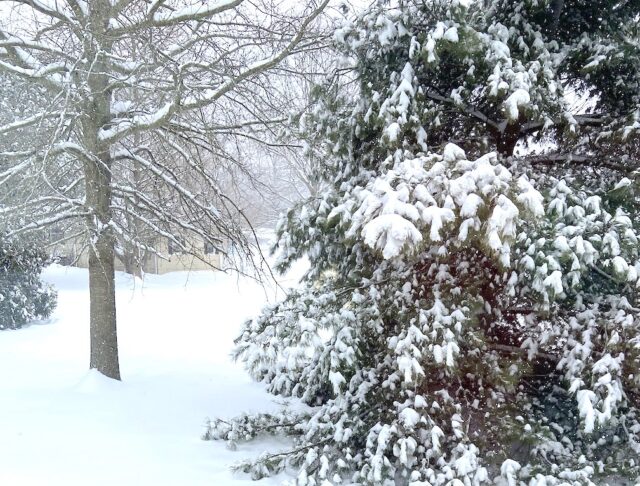By Dr. Bill Chasanov and Dr. Paul Sierzenski (Beebe Healthcare)
Sussex County received quite the snowfall on Monday (Jan. 6), and many community members might have waited to start digging out throughout the following day.
Beebe is encouraging our community to stay safe and consider these safety tips when shoveling and other related activities during the coming days.
Dr. Bill Chasanov and Dr. Paul Sierzenski of Beebe Healthcare want to share these safety tips to keep our community safe.
Snow Shoveling Tips
The physical exertion of shoveling paired with cold temperatures increases the heart’s workload. Additionally, always look at the area and evaluate it for ice. Ask yourself, “Is it safe for me to be here and shovel snow?”
Give yourself breaks
Take frequent rest breaks while shoveling so you do not overstress your heart. Pay attention to how your body feels during those breaks. Drink plenty of water.
Consider your Footwear
Wear smart shoes with good traction to avoid falling on ice.
Ask for Help
If possible, and to avoid potential injury, particularly for high-risk groups such as the elderly, consider asking a neighbor, hiring someone, or contracting a service to help clear the snow. Check local Facebook groups and Nextdoor for potential Good Samaritans who are willing to help or for paid services.
Do not eat a heavy meal prior to or soon after shoveling
Eating a large meal can put an extra load on your heart.
Use a small shovel or consider a snow blower
The act of lifting heavy snow can spike blood pressure. It is safer to lift smaller amounts of snow more times than to lift a huge shovelful of snow. When possible, simply push the snow.
Pick the correct snow shovel
An ergonomically designed version may cost more, but it helps minimize painful bending to save your back as you shovel your driveway and sidewalks. Look for one that has a curved handle, adjustable handle length, and a small, lightweight, plastic blade. Even better, consider using a snow blower.
Lift Safely
Like weightlifting, bend at your knees, not your back, and use your legs when possible.
Learn the heart attack warning signs and listen to your body
Even if you are not sure it is a heart attack, have it checked out (tell a physician or advanced practice clinician about your symptoms). Minutes matter! Fast action can save lives — including your own. Do not wait more than five minutes to call 911.
Do not drink alcoholic beverages before or immediately after shoveling
Alcohol may increase a person’s sensation of warmth and may cause them to underestimate the extra strain their body is under in the cold. It also could make you unbalanced on slippery and icy surfaces.
Consult a healthcare provider
If you have medical conditions such as hypertension, diabetes mellitus, heart disease, do not exercise on a regular basis, or are middle aged or older, talk with your healthcare physician or advanced practice clinician regularly to understand if you are healthy enough to shovel.
Be aware of the dangers of hypothermia and frostbite
Other dangers associated with extreme cold temperatures include frostbite and hypothermia. Frostbite is caused when body tissue — usually exposed body parts away from your core like fingers, toes, ears or nose — freeze due to prolonged exposure to cold and a low wind-chill factor.
To prevent these serious conditions, dress in layers of warm clothing, which traps air between layers forming a protective insulation. Wear a hat because much of your body heat can be lost through your head.
We are a community
Beebe Healthcare urges community members to remember to check on your family, friends, neighbors, and especially seniors. As it can be difficult and dangerous to get around, many seniors have less contact with others during cold months. This can lead to feelings of loneliness and isolation.
To help avoid these issues, check in on seniors as often as possible; even a short, daily phone call can make an enormous difference. Seniors can also arrange a check-in system with neighbors and friends, where each person looks in on one or two others daily.
Where to find care
Find the latest openings and closing of Beebe Healthcare locations for this winter storm here: beebehealthcare.org/news-release/1-pm-update-beebe-healthcare-announces-operations-tuesday-jan-7.
Beebe’s Walk-In Care Centers and Emergency Departments are ready to care for you today (Jan. 7). Virtual visits are also available when clinically appropriate. To schedule a virtual visit for Walk-In Care, please visit: beebehealthcare.org/services/walk-care and choose the virtual visit option at the bottom right.
Beebe continues to make decisions with our patients’ needs in mind who are showing up for emergent and medically necessary care. Thank you to our team members who have been able to provide the availability of these needed services to Sussex County.








